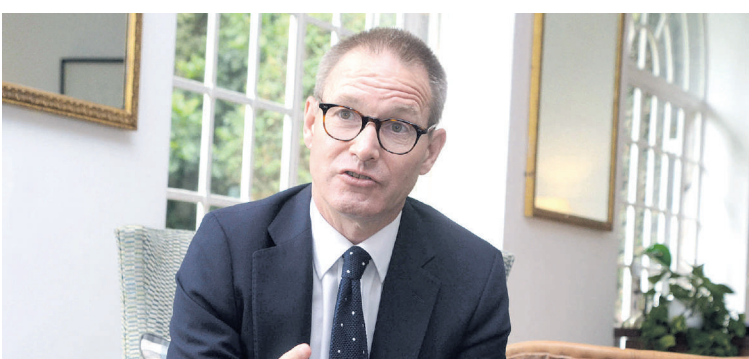

UK’s efforts to facilitate more British investors in Kenya have been frustrated by concerns about corruption, bureaucracy and slow decision-making, outgoing High Commissioner Neil Wigan has said.
Speaking to the Star in his exit interview, Wigan said despite huge emphasis on growing the investments, some British companies have found the business environment “very difficult”.
“That has been a challenge while I've been here,” the envoy said on Thursday.
Wigan noted that the situation is dissuading investment appetite not only from UK firms but also from all over the world despite the huge potential to invest in Kenya.
“Tackling corruption is very difficult everywhere, and Kenyans tell me because it has become engrained in the system, it's very difficult to change those deep-rooted behaviours,” he said.
“But we think that if Kenya can do that and can be a real model for fighting corruption, it will really help the Kenyan economy. Kenya can tackle corruption and reduce risks for those investors. We think that can create jobs and growth.”
He, however, noted that he has engaged Kenyan authorities on the same, openly discussed the corruption problem and gotten clear commitments to address it.
“The Kenyan government has been open and engaged from the President, ministers and independent bodies, such as the EACC, the DPP and the police. We talk very openly about corruption, that they address it as a problem, there's no hiding it,” Wigan said, adding that Kenya could be a good UK partner in the fight against corruption.
“The Constitution is good. You have all the independent institutions in place. We hear strong signals of political will. It's just driving that through which is difficult, but we see the opportunity.”
Corruption is a currently a national debate after President William Ruto accused Parliament of being a haven of bribery. He also announced the establishment of a multi-agency team to tackle corruption, which has since been suspended by the courts.
The 2024 Transparency International Corruption Perceptions Index ranks Kenya 121 out of 180 countries, with a score of 32 out of 100. A higher score indicates less perceived corruption.
A study by the EACC in August found corruption is rife in public institutions, particularly in the police service, Kenya Revenue Authority and national administration.
The envoy also spoke about his tour of duty, colonial atrocities and those committed by the British Army Training Unit Kenya (Batuk), security, trade and Kenya’s political situation.
The Star: How has your two-year of tour of duty been? Challenges and achievements?
Wigan: Mostly too short. I planned to be here for three or four years, so I feel I'm leaving not having done all the things I wanted to do. But we've had some big successes. The King's visit, his first as king to any country outside Europe to any Commonwealth country.
The reaction we got from the President, conservationists, farmers and everybody he met has been positive. More recently, President [William] Ruto was in London, and we signed a new strategic partnership that sets out joint plans for the next five years.
There is the security compact as well, and we've made progress on some big projects that will help both states.
Nairobi Railway City is high on the list. We are trying to have a more modern relationship with Kenya focused on where Kenya will be in 10 years' time and how Britain can help with that.
For the first time, we've put science technology and innovation as a core part of the relationship. There are some big infrastructure and other projects I wish we could have done but we're on track with most of them. My successor will have some good things.
Challenges: Delivery is difficult, particularly for the big, complicated projects, which engage lots of different bits of the Kenyan government, and with big financing implications. Those can be quite slow.
Why is the Kenya-UK Strategic Partnership 2025-30 framework important for the mutual benefits for the two states?
We’ve got a very wide wide-ranging relationship with Kenya. Often, when people in London are thinking about who do we want to partner with on a wide range of issues, Kenya is often the first country they think of, particularly in Africa and in East Africa. That means we're trying to do everything. What we want to do in the strategic partnership is to focus on the smaller number of areas, some really big, high impact issues, which are difficult to deliver but quite ambitious.
The strategic partnership includes the Nairobi Railway City project. This is implemented alongside other G7 countries. How will the respective states ensure coordination and standards in executing the bigger transport project?
We discovered many donors are working on different areas of transport in Nairobi, but it wasn't being coordinated. We're now using the G7 and then working with the Prime CS [Musalia Mudavadi], bringing this all in together to see how it links together and support each other. This could really transform Nairobi. Nairobi has this huge opportunity of this land right in the centre of town. If we can get the transport, the infrastructure and real estate development right, it can make a huge difference to people travelling, working and shopping in Nairobi.
Is there a standardization mechanism the countries have adopted?
We have regular coordination meetings not only with the Prime CS, the G7 members, but also the World Bank, the EU and others. Then with Kenyan ministries, Kenya Railways, departments, to work together and agree a work plan about how we do this. The UK provides some specific support to the Kenyan government to help drive this project along.
The two states also signed the UK-Kenya Security Compact. What would you cite as successful interventions through this framework in the war on terrorism?
We've seen big progress in Kenya. I was in Nairobi during the Westgate attacks in 2013 and saw the threat it posed. We have been working with the Kenyan government on counterterrorism even prior. We're not complacent, terrorists can always attack anywhere. The security environment in Nairobi and in most of Kenya feels much better, and we think Kenya is one of our closest security partners anywhere in Africa.
On counterterrorism, we hope to see real progress in the community institutions in how they work together, from the police, to the courts to the prison system. That’s something Kenya should be proud of, having made that progress. As I said, we can never be complacent, we still see attacks particularly along the border with Somalia, but we think the cooperation is really strong.
The visit by King Charles III was expected to offer a closure to colonial atrocities. However, you then indicated it would be difficult to apologise due to the legal ramifications this might lead to. Why this position?
This is a complex question and it covers the whole world. It's not just a Kenya issue.
In the King’s visit and more broadly, we wanted to be much more open, honest and to engage, and to meet the sort of families, individuals and communities that were particularly affected by British rule.
The King wanted to do that personally. In this room, he met some of those people and representatives. He talked about it openly in his speech. We'd maintained connections with those people, so I visited some of them in their homes, many of them have come here.
I handed over to the President archives from the British period here, including intelligence files issues around the Mau Mau. We're trying to be much more open and engaged on this. The reaction is positive, and we've heard many people say, “This has felt very meaningful to us, we haven't seen this before from the UK.” We welcome that as a sign of goodwill and part of closure.
Will Batuk officials appear before the Parliamentary inquiry? Will the family of Agnes Wanjiru and others get justice? And how will justice look like?
We'll wait to get the invitation. But I've met the chairman of the committee, Nelson Koech, several times, and we've talked a lot about this. I've spoken to people in Nanyuki, and mostly, the feelings towards Batuk are very positive.
It's a big employer, it provides a lot of opportunity and helps the economy, but we expect British soldiers to behave with the highest standards all the time here in Kenya. Where that doesn't happen, we've committed to taking our action on it.
On Agnes Wanjiru, it was horrible case. I've met the family. I was the first British representative to meet the family, and I've met them repeatedly since. Our Defence minister met them when he came here, and we maintained close contact with them, and I have huge sympathy for what they've been through and huge respect for the dignity.
We have said that we will cooperate. It's a Kenyan-led investigation, and we' said that we will cooperate fully on that. Kenyan authorities have said publicly that they've had really good cooperation. So now it's in the hands of the Kenyan system, and we don’t want to interfere in an ongoing investigation and decision process, but we will do everything that we can to help get justice. And where other allegations come up, other incidents, we will take them seriously.
Since the Gen Z demos started, there have been concerns over state excesses and rights abuses. As you leave, do you feel the government is addressing or changing the course around these issues?
We raised this in public, including with other missions. We've also discussed it privately with the political leaders at Interior, police officials and security officials.
They're conscious of the scrutiny they're under, and that they need to address people's concerns. It's very difficult. Policing big demonstrations is very challenging, so we don't underestimate the difficulties. But we think Kenya's reputation is somewhere with the rule of law, accountability, freedom of speech and freedom of assembly.
Where there have been cases of excessive force, where the law has been broken, including by security forces, it's important that there's accountability.
What do trade numbers look like as you leave?
Better than when I arrived. It has gone up from about £1.4 billion (Sh243.9 billion) a year to £1.8 billion (Sh313.6 billion), and it's good for both sides. There's a balance in Kenya's favour, which is not true of all of its big trading partners.
There's potential to do much more, particularly in new fields, of Kenya exporting higher value products to the UK, and for us to move more into advanced services and technology, which can also help make Kenya a regional centre.
Lloyd's of London, one of the biggest insurance companies in the world, we hope that can make it a centre. Other companies like Bupa have opened up in Kenya to use Nairobi as a regional centre. There is potential to do much more at that kind of advanced areas. We are doing better, but we could do much more.
What’s your parting shot?
I think I leave the relationship in a good place. The President's visit really showed how much opportunity there is for the relationship. And now we need to really deliver on that and on making it a modern partnership about the future that delivers concrete benefits for citizens of both countries. We're on the path there, but there's a lot more to do to deliver it. I'm just sorry it's not going to be me doing it.











